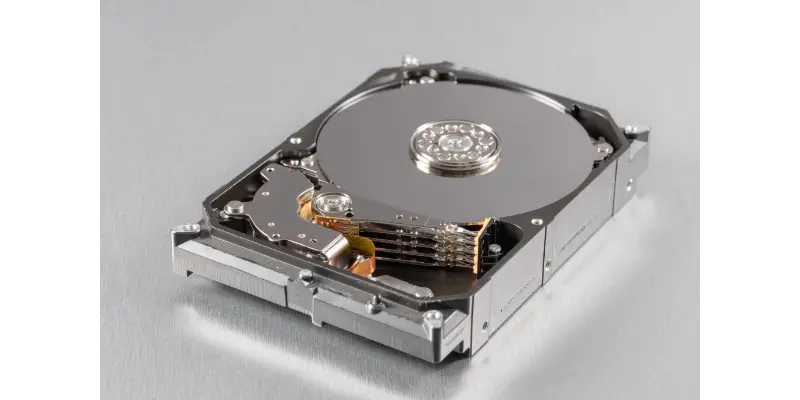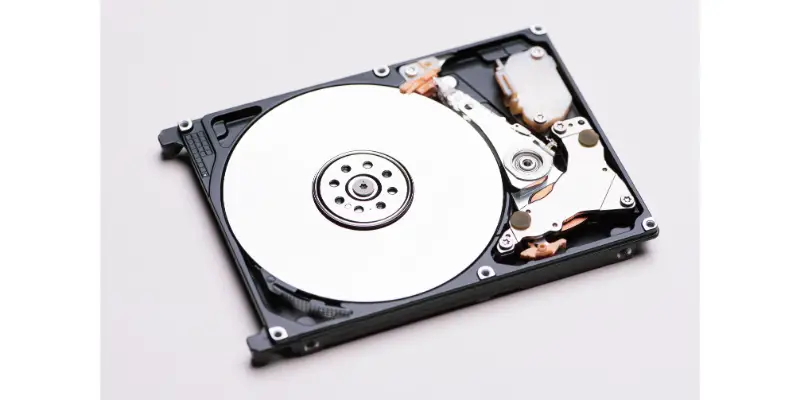Disclaimer: This post may contain affiliate links, meaning we get a small commission if you make a purchase through our links, at no cost to you. For more information, please visit our Disclaimer Page.
If you’re like me, you have a pile of old hard drives in your desk, some of which you’ve forgotten about. And some of those drives are probably filled with data you’ve long since abandoned. But how long do hard drives last if not used?
If not used, a hard drive can last for a minimum of 3 years and a maximum of ten years, depending on the product and how you store it. There is no specific number of years for all hard drives, but the most generally accepted average number of years a hard drive can last if not used is five years.
Table of Contents
How Long Does a Hard Drive Last?
The fact that hard drives can fail with time may be a surprise to many, but either you are a business, institute, or just a person with valuable data, you must know about the longevity of your hard drive to avoid loss of valuable data.
Many things determine the longevity of your hard drive, some of which are your environment, the quality of the hard drive (which is often determined by the brand), and how often you use the hard drive.
The online backup company Backblaze carried out research where the failure rates of 25,000 hard drives were analyzed. The result of this analysis provides one of the best and most reliable answers to the golden question; how long does a hard drive last?
From the research analysis, the lifespan of a hard drive averagely ranges from three to five years. It means that your hard drive will function properly for about three years, but after that, you can expect a huge rise in its failure rate within the 3rd and the 5th year of use.
Nevertheless, this statistic can only help you estimate your hard drive’s longevity as the research was carried out on only 2500 hard drives and the life span of hard drives varies based on different criteria.
However, to guarantee your hard drive’s longevity, you should purchase a brand that has a reputation for quality and ensure to maintain a clean environment as you avoid too frequent use of your hard drive.
No matter how long your hard drive lasts, to guard against a sudden loss of important data, it is advisable that you backup your hard drive regularly.
How Long Does a Hard Drive Last if Not Used?
A hard drive does not have a definite span. To ensure a longer lifespan for your hard drive, it is essential that you do not use it too frequently. That said, not using your hard drive can help guarantee longevity, but even this is determined by the quality of your hard drive. Some hard drives will have spinning difficulties if not used for two months, while others of better quality will last for a year or more.
Note that spinning difficulty does not mean the end of the road for your hard drive. Leaving your hard drive to work in a period of 24 hours can fix the spinning issue. Generally, a hard drive has an average life span of about five years, but an unused hard drive can last a little longer.
A good hard drive, if not used, can last up to 10 years even. A used hard drive is more exposed to things that can reduce its lifespan, like electrical surge, among others.
A common notion people have is that not using your hard drive means the next time you will use it, it will be exactly as you left it. This is not true as exposure to air, for example, can cause rust over time (air is everywhere). Also, used hard drives get warmed up with use. Just like a car engine, using your hard drive can be healthy for your hard drive too.
Do Hard Drives Fail if Not Used?
There are differing opinions on this particular question by different hard drive users. Some assume that it does fail over time if not used, just like other technological products, while others believe depending on how it is stored, your hard drive should not fail if not used over time.
You should note that time is relative and can differ from one end of the argument to another. You should also note that the above question could mean; if the hard drive was kept right after purchase not being used at all or if it was used for a while and then kept (not used) for a long time.
Most of the arguments that hard drives do not fail if not used are based on personal experiences where hard drives were not used for about five years.
Remember I mentioned that time is relative here? Looking at specific facts, it is inarguably true that hard drives do fail if not used, but the failure will depend on; storage, if it was being used before, the quality of the hard drive, and how long it had been unused.
Hard drives are made of magnetic fields, which do wear down over time without use. This is one of the major reasons why hard drives fail if not used.
Also, the moving parts of a hard drive are somehow lubricated at the stage of manufacturing. Over time (usually a very long time), the lubrication goes dry, and once friction sets in, the hard drive begins to fail.
In addition, as long as air blows on and into the hard drive, rust is inevitable. Air contains water which brings about rust, and rust weakens the metal materials that the hard drive is made of.
All these facts guarantee the failure of your hard drive over time, but the way you store your hard drive when it is not being used will determine how fast it will fail. Nevertheless, depending on how long your hard drive stays unused, it will eventually fail.
How Do You Know If Your Hard Drive Is Still Good?
There are several ways to check if your hard drive is still good:
- Check for strange noises: If you hear clicking, grinding, or whirring sounds coming from your hard drive, it could be a sign of a mechanical issue.
- Monitor the temperature: If your hard drive is running too hot, it could be a sign of a problem. You can use software tools to monitor the temperature of your hard drive.
- Check for bad sectors: Bad sectors are hard drive areas that are damaged and cannot be used for data storage. You can use disk-checking tools like CHKDSK (Windows) or Disk Utility (Mac) to scan for bad sectors.
- Check the S.M.A.R.T. status: S.M.A.R.T. (Self-Monitoring, Analysis, and Reporting Technology) is a feature built into most hard drives that monitors the drive’s health. You can use software tools like CrystalDiskInfo (Windows) or DriveDx (Mac) to check the S.M.A.R.T. status of your hard drive.
- Backup data: Backing up your important data regularly is one of the best ways to ensure you don’t lose your data if your hard drive fails.
It’s important to note that even if your hard drive passes all of these tests, it can still fail unexpectedly, so it’s always a good idea to keep backups of your important data.
How long does data last on an unused hard drive?
The hard drive tends to fail; hence, it is not suitable for storing data for too long. As its lifespan is limited, the data on it is also at risk of loss. If you keep data on your hard drive, you should try not to keep it for up to 3 years in case of vital data.
To be on the safe side, a period of 2 years is enough to store data on your unused hard drive. This is because most hard drives have a minimum life span of 3 years.
That means your data must have been moved to another storage before the hard drive begins to fail. In case of ‘not so important data’ to avoid losing all your data, five years should be the maximum.
Data left for over five years stands the risk of being lost unless you rewrite it on the hard drive or move it to another storage. A major issue with this is that storage technology is subject to change.
This means in 5 years, your data format may not be ‘readable’ as a result of upgrades and modifications in storage technology.
Therefore to keep up with the trend, it’s best to check your stored data in 2 years and either modify the format, rewrite on the hard drive, or move to another storage.
Conclusion
The hard drive is an important component of the computer. It stores valuable data, and for this reason, you should handle it with deserved care and carefulness.
Either used or unused, your hard drive must be stored and handled properly to ensure it lasts. You may want to make plans to replace your hard drive every five to ten years to further guarantee the safety of your data over a very long period.
If you are considering buying a hard drive, you should buy from a brand with a reputation for quality products, as that will go a long way to determine its lifespan. Nevertheless, remember that hard drives are not meant to last forever.


